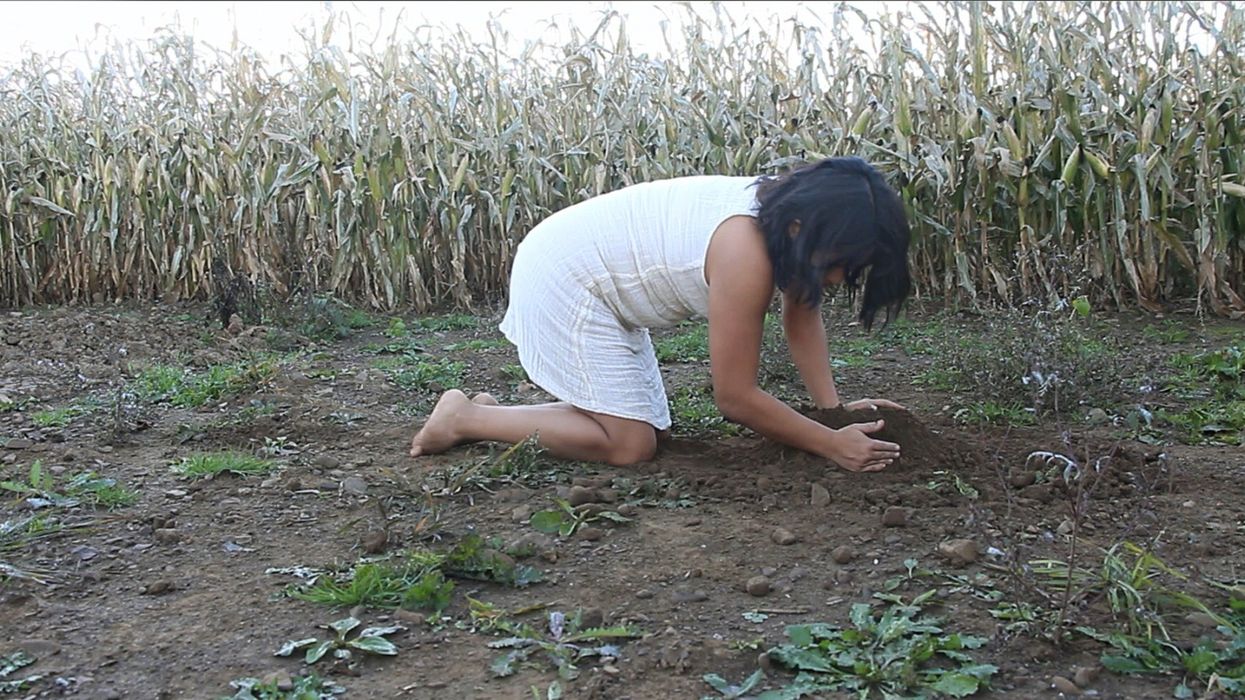While the Trump administration seeks to erase places for those with historically marginalized identities, Woman Made Gallery offers more than representation—it offers response. Through exhibitions like the most recent Acts of Care, the gallery creates an intentional space where women, women of color, and nonbinary artists don't have to ask for permission to belong—they build that belonging themselves. As a nonprofit rooted in justice and community dialogue, Woman Made Gallery continues to model what inclusive, women-of-color-led spaces can look like: ones that honor lineage, complexity, and care as forms of resistance.
For Program Coordinator Corinne Pompéy, the mission of Woman Made Gallery is more than just representation—it’s about creating an entry point for connection and care. “Our goal is to ensure women and nonbinary artists are seen in the art world,” she said. “But more than that, we want people to feel something when they walk in—whether that’s reflection, joy, or even release.”
At a time when national debates threaten to silence historically marginalized communities, Woman Made Gallery remains a refuge for artists whose identities and stories are often overlooked. In its 33rd year, the Chicago-based nonprofit has featured over 10,000 women and nonbinary artists in nearly 500 exhibitions, offering more than just wall space—it provides representation, community, and a platform for dialogue. The gallery reaffirms its commitment to justice, equity, and visibility—especially for women of color and gender-expansive artists—through programs designed to foster conversation and build solidarity in a cultural landscape that is still slow to evolve.
The current Acts of Care exhibition, juried by former intern and now art history professor Kristen Carter, invites artists across the country to explore what care looks like in their own lives. The result is an emotional landscape of motherhood, grief, intimacy, and healing.
“Someone was crying earlier today in front of a piece,” Pompéy said. “That’s what it’s about—that connection.”
But connection, especially for women of color, doesn’t happen by accident. “It starts at the door,” Pompéy said. “When people walk into Woman Made, we want them to feel like they belong. That means having a diverse staff, board, and even jurors—people who understand different cultural contexts, because that shapes how we view art.”
For Pompéy, who co-founded a feminist gallery at Columbia College Chicago before joining Woman Made Gallery, building intentional spaces also means inviting community organizations in for workshops and partnerships. “We want people to see themselves in every layer of what we do—from the website to the exhibitions to the programs. That’s how trust begins.”
Pompéy’s own journey is a testament to how spaces like Woman Made can spark deeper change. “Working here feels like I’m giving back. It feels like I’m making a difference,” she said. As the art world reckons with its ongoing inequities, Acts of Care offers a concrete response: platforming the creative labor of women and gender-expansive artists who are building community not just despite exclusion—but because of it.
A Chicago-based artist and writer at the exhibition, Jessica Gomez Ferrer, said, “I'm interested in weaving and knotting and working with fiber, because when I weave with paper, it is pretty flat, but there's a dimensionality that gets built into it. As you like, weave the structure.”
“Kind of metaphor of building depth as a representation of, like, my experience growing up as the child of immigrants in the US. I'm Filipino, but sometimes I don't feel Filipino enough. Or I'm American, but like, I am passively fluent in Tagalog, and like, what are all the implications of that? A lot of my work is trying to celebrate Filipino craft traditions, but kind of in my way, in my own way, and also, like, the kind of occupations and the kind of care work that a lot of the women in my family grew up doing.”
The Woman Made Gallery becomes a meeting point for voices that have long been pushed to the margins – women of color who carry with them the weight of inherited displacement and cultural hybridity.
“My practice interrogates who gets to belong, who is erased, and what it means to return when return isn’t possible. I see the margins not as spaces of lack, but as fertile ground for dreaming, healing, and survival,” said Salvadoran multidisciplinary artist Lorena Molina from the exhibition. “ My work is driven by a deep sense of displacement experienced after a 12-year-old civil war forced my family and me to immigrate to the United States. Most of my work stems from a need to find and build community in a way that is both tender, accountable, and challenging—through difficult conversations that make everybody involved actively question their position and privileges in society.”
Despite differences in cultural backgrounds, Woman Made Gallery creates a place where those who feel like they don't belong can belong together.
Maria Jose Arango Torres, a student at Northwestern University and an intern with the Latino News Network.




















Trump & Hegseth gave Mark Kelly a huge 2028 gift